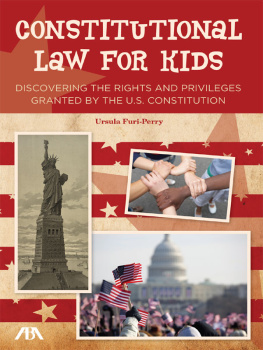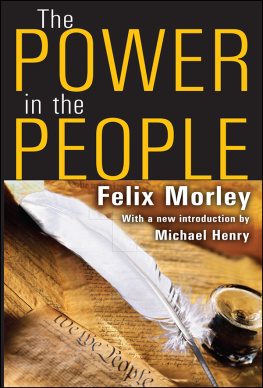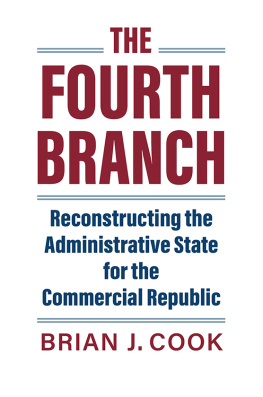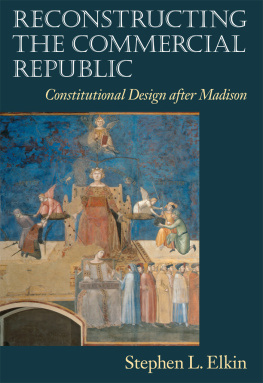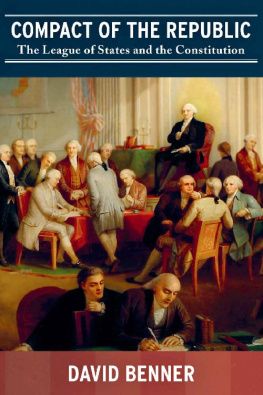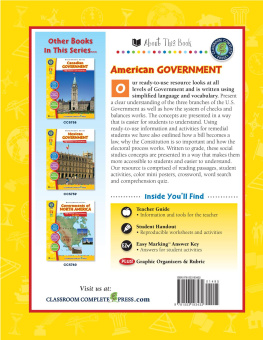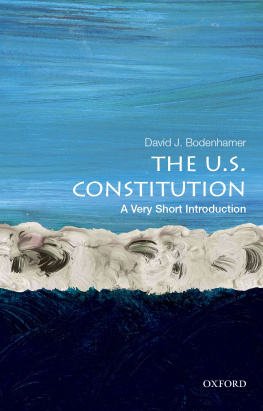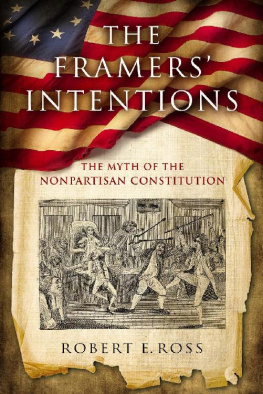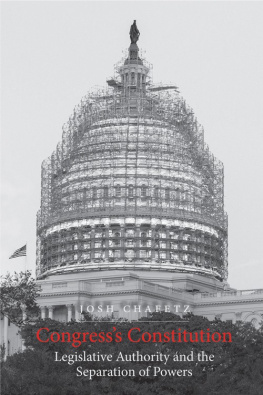

2015 by Jay Cost
All rights reserved. No part of this publication may be reproduced, stored in a retrieval system, or transmitted, in any form or by any means, electronic, mechanical, photocopying, recording, or otherwise, without the prior written permission of Encounter Books, 900 Broadway, Suite 601, New York, New York, 10003.
First American edition published in 2015 by Encounter Books, an activity of Encounter for Culture and Education, Inc., a nonprofit, tax exempt corporation.
Encounter Books website address: www.encounterbooks.com
The paper used in this publication meets the minimum requirements of ANSI/NISO Z39.481992 (R 1997) (Permanence of Paper).
FIRST AMERICAN EDITION
LIBRARY OF CONGRESS CATALOGING-IN-PUBLICATION DATA
Cost, Jay.
A republic no more : big government and the rise of American political corruption by Jay Cost.
pages cm
Includes bibliographical references and index.
ISBN 978-1-59403-728-3 (ebook)
1. Political corruptionUnited States. 2. RepublicanismUnited States. I. Title.
JK2249.C69 2015
364.13230973dc23
2014032671
This book is dedicated to the memory of Daniel R. McKenzie
The stock-jobbers will become the pretorian band of the Government, at once its tool & its tyrant; bribed by its largesses, & overawing it by clamours & combinations.
JAMES MADISON, LETTER TO THOMAS JEFFERSON, AUGUST 8, 1791

I decided to get far enough along to be able to control legislation that meant something to men with real money and let them foot the bills. Never commit yourself but always be in a position where you can if you choose. The men with money will look you up then and you dont have to worry about campaign expenses.
SENATOR BOIES PENROSE (REPUBLICAN, PENNSYLVANIA)

We manage our political risk with the same intensity that we manage our credit and interest rate risks.
FRANKLIN REINES, FORMER CEO OF FANNIE MAE, IN A 1999 MEETING WITH INVESTORS
Contents


T O BEGIN, a warning to the reader: this book is about political corruption, but it is not about Watergate. It is not about Abscam. It has little to say about Teapot Domes, and you will not find a word between these covers about Monica Lewinsky or Paula Jones. There are books out there that chronicle, in lurid detail, these events. This book is not one of them.
All of those stories have a few items in common. Somebody breaks the law and (more or less) gets punished for it. There is a perp walk of some sort to reassure us thatin the endgood triumphed because indecency was exposed for what it was. Even if the bad guys go to the grave escaping the long arm of the law, the arm of the historian reaches farther still, and the audience can rejoice in the culprits reputations duly suffering for their civic transgressions.
This book, rather, has much more to do with the guys who got away with it, in particular the guys who flaunted it while getting away with it. In the 1890s, as Congress was writing tariff laws governing sugar, Pennsylvanias political boss, Senator Matthew Quay, admitted that, yes indeed, he was speculating in the sugar markets, that he would go right on doing so even as he voted on the sugar tariff, and there wasnt a damned thing anybody could do about it, thank you very much. He was right. A decade later, William Randolph Hearst exposed his successor, Boies Penrose, as being on the take from Standard Oil. Nothing came of it, and Penrose was reelected several times thereafter. He died in office.
Why did nothing happen to those men? Simple: they were not breaking the laws of their day. That is the fascinating feature about corruptionoften, it has absolutely nothing to do with illegal activity. There are plenty of ways, as we shall see, to be corrupt without being criminal. More often than not, the criminals merely lack self-control or self-awareness. That makes them easy targets for rebuke, and thus reasons to feel good about ourselves and our government.
But as Quay and Penrose prove, the law often has trouble keeping up with corruption, in no small part because the people who write the laws like it that way. Perhaps George Washington Plunkitt, a sachem (or boss) of New York Citys Tammany Hall about a century ago, puts it best:
Everybody is talkin these days about Tammany men growin rich on graft, but nobody thinks of drawin the distinction between honest graft and dishonest graft. Theres all the difference in the world between the two.... Ive not gone in for dishonest graftblackmailin gamblers, saloonkeepers, disorderly people, etc.and neither has any of the men who have made big fortunes in politics.
Theres an honest graft, and Im an example of how it works. I might sum up the whole thing by sayin: I seen my opportunities and I took em.
Just let me explain by examples. My partys in power in the city, and its goin to undertake a lot of public improvements. Well, Im tipped off, say, that theyre going to lay out a new park at a certain place.
I see my opportunity and I take it. I go to that place and I buy up all the land I can in the neighborhood. Then the board of this or that makes its plan public, and there is a rush to get my land, which nobody cared particular for before.
There was nothing honest about Plunkitts fraud, but he was onto something in drawing the distinction he did. Dishonest graft is criminal activity that harms people directly, whereas honest graft is technically legal, and the victim is the common good, not a particular individual. What Plunkitt was doing in his day would be outlawed today, but honest graft nevertheless survives, in different forms, always changing to stay one step ahead of the law.
Why is this the case? The answer to that question is the subject of this book.
So, what follows is not a tale of heroes and villains. Herein, you will not find clear-cut victories, glorious moments of truth being spoken to power, or exhilarating climaxes when the hard-charging civic hero triumphs and the citizens faith in government is restored. If youre looking for that, go read All the Presidents Men. Similarly, the story here does not have the satisfaction that Calvinism supplies: government in this account is not a hopeless, immoral cesspool where everybody is out for themselves and nobody does what is right, and the only thing to do is await the cleansing hellfire unleashed by the Almighty. If youre looking for something like that, House of Cards is for you.
Instead, this book is about corruption as a permanent, institutionalized feature of our government. Less sexy, perhaps, but it makes for an interesting puzzle. After all, our Founding Fathers were frankly concerned about corruption, so much so they designed a system to prevent it from occurring. Yet it has occurred anyway. Understanding this irony is the purpose of the book in your hands. While this may not offer much by way of emotional gratification, it ison closer inspectionmuch more fascinating. And it can teach us some very important lessons about how our government actually works.
Next page

